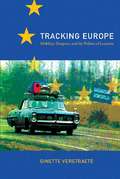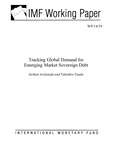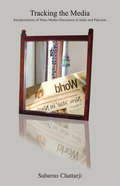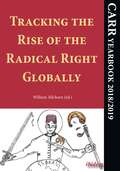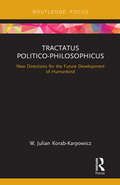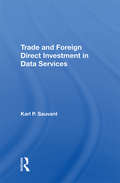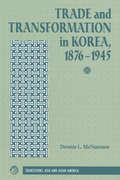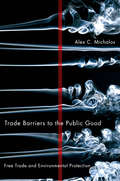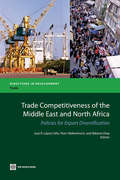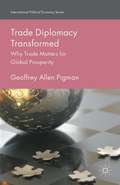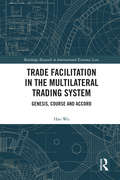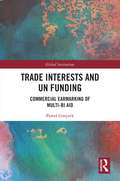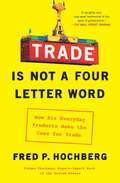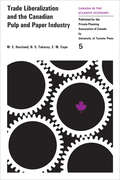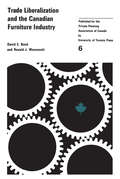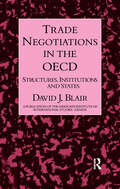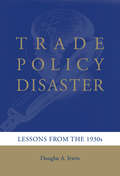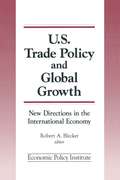- Table View
- List View
Tracking Europe: Mobility, Diaspora, and the Politics of Location
by Ginette VerstraeteTracking Europe is a bold interdisciplinary critique of claims regarding the free movement of goods, people, services, and capital throughout Europe. Ginette Verstraete interrogates European discourses on unlimited movement for everyone and a utopian unity-in-diversity in light of contemporary social practices, cultural theories, historical texts, media representations, and critical art projects. Arguing against the persistent myth of borderless travel, Verstraete shows the discourses on Europe to be caught in an irresolvable contradiction on a conceptual level and in deeply unsettling asymmetries on a performative level. She asks why the age-old notion of Europe as a borderless space of mobility goes hand-in-hand with the at times violent containment and displacement of people. In demystifying the old and new Europe across a multiplicity of texts, images, media, and cultural practices in various times and locations, Verstraete lays bare a territorial persistence in the European imaginary, one which has been differently tied up with the politics of inclusion and exclusion. Tracking Europe moves from policy papers, cultural tourism, and migration to philosophies of cosmopolitanism, nineteenth-century travel guides, electronic surveillance at the border, virtual pilgrimages to Spain, and artistic interventions in the Balkan region. It is a sustained attempt to situate current developments in Europe within a complex matrix of tourism, migration, and border control, as well as history, poststructuralist theory, and critical media and art projects.
Tracking Global Demand for Emerging Market Sovereign Debt (Imf Working Papers #Working Paper No. 14/39)
by TsudaA report from the International Monetary Fund.
Tracking and Disrupting the Illicit Antiquities Trade with Open Source Data
by Matthew Sargent James V. Marrone Alexandra T. Evans Bilyana Lilly Erik Nemeth Stephen DalzellThe illicit antiquities market is fueled by a well-documented rise in looting at archaeological sites and a fear that the proceeds of such looting may be financing terrorism or rogue states. In this report, the authors compile evidence from numerous open sources to outline the major policy-relevant characteristics of that market and to propose the way forward for developing policies intended to disrupt illicit networks.
Tracking the Media: Interpretations of Mass Media Discourses in India and Pakistan
by Subarno ChattarjiThis book is about media content analysis in the English language print media in South Asia, with reference to certain contemporary issues. It is written from the perspective of the need to analyze media discourses and the ways in which their circulation creates a ‘common sense’ view of the world. The focus is on English language papers and news magazines; additionally, some Hindi, Urdu, and Sindhi newspapers are examined. The highlight is on the ways in which English language publications contribute to and function within middle class matrices of modernity, consumption, conflict, and conservatism in India.
Tracking the Rise of the Radical Right Globally: CARR Yearbook 2018/2019
by William Allchorn2018 was a tumultuous year in global politics. Starting with the rise of the Lega Nord in Italy and ending with the election of Jair Bolsonaro in Brazil, it has never been such a pertinent time to study the radical right. This yearbook pulls together the best commentary and analysis from an international consortium of expert scholars examining the ebb and flow of radical right movements from around the world. Starting with a concise analysis of key definitions of the radical right and historical precursors, it takes the reader on a journey through European, then American, and finally through non-Western manifestations of the radical right. The book ends with a thematic analysis of key tactics and issues related to the radical right—including social media, hate crime, and terrorism. This unique survey provides an unparalleled snapshot of global developments in 2018—useful to scholars, students, practitioners, and interested members of the public alike.
Tractatus Politico-Philosophicus: New Directions for the Future Development of Humankind
by W. Julian Korab-Karpowicz"Our time is the age of postmodernity and of the clash of epochs. But a new age of humanity is rising. It is evolutionity or the evolutionary epoch which replaces modernity and postmodernity." Tractatus Politico-Philosophicus (Political-Philosophical Treatise) aims to establish the principles of good governance and of a happy society, and to open up new directions for the future development of humankind. W. Julian Korab-Karpowicz demonstrates the necessity of, and provides a guide for, the redirection of humanity. He argues that this paradigm shift must involve changing the character of social life and politics from competitive to cooperative, encouraging moral and intellectual virtues, providing foundations for happy societies, promoting peace among countries and building a strong international community. Korab-Karpowicz’s seven principles for a happy society are: Cooperation Justice Wise Leadership and Civic Virtues Education for Virtue and Knowledge Good Laws Political Knowledge Continuity of Generations
Trade And Foreign Direct Investment In Data Services
by Karl P. SauvantData services are among the most dynamic components of international trade and foreign direct investment. Technical progress, changes in the economic sector, factors influencing the international specialization in data services, and the impact of obstacles combine to determine the growth of trade and foreign direct investment in data services. UNCTC assumed the responsibility for preparing the sectoral paper on trade and foreign direct investment in data services (transborder data flows). The scope of the paper was to include an examination of the importance and impact of the emerging data-service industries, especially in Latin America; a clarification of conceptual issues related to trade and foreign direct investment in data services; a documentation of the dimensions of various forms of international transactions in services; an analysis of the determinants of these transactions; a review of the policies and issues relating to them; and an outline of possible actions at the national, regional, and international levels for dealing with questions related to data services. The present study contains the results of the work on these issues. Special attention is given throughout this book to developing countries in general and Latin American countries in particular.
Trade And Transformation In Korea, 1876-1945
by Dennis McnamaraExploring the interaction among system, state, and society, this book illuminates the social and economic history of late nineteenth- and early twentieth-century colonial Korea. Dennis McNamara argues that transformation within and trade abroad, led by rice exports, spurred Korea's shift from isolation to inclusion in a modem regional system. In hi
Trade Barriers to the Public Good: Free Trade and Environmental Protection (McGill-Queen's/Beaverbrook Canadian Foundation Studies in Art History)
by Alex C. MichalosThe North American Free Trade Agreement (NAFTA) and the Agreement on Internal Trade (AIT) were designed to strengthen investor's rights at the expense of community rights and environmental protection. Both deals have achieved their aims. Trade Barriers to the Public Good provides a detailed examination of NAFTA and AIT cases involving MMT - a chemical additive brought into Canada by the US company Ethyl Corporation Inc. When the Canadian federal government banned the importation of MMT under the Fuel Additives Act, Ethyl Corp. filed a claim under NAFTA Chapter 11 seeking US $201 million in damages. Alex Michalos uses a case study of MMT to reveal exactly how and why quasi-judicial international dispute processes provide significantly less protection for the public interest than the routine procedures for passing an ordinary Act of Parliament. Trade Barriers to the Public Good illustrates why and how constitutionally protected democratic rights are undermined by trade deals such as the one involving MMT and, failing termination of NAFTA and AIT - the author's first choice for remedial action - recommends precise changes in dispute settlement rules that are needed to protect individuals and the environment.
Trade Competitiveness of the Middle East and North Africa: Policies for Export Diversification
by Peter Walkenhorst Ndiamé Diop José R. López-CálixOver the past decade, four major developments in global economic integration have shaped trade policy and the economic performance of countries within the Middle East and North Africa region: the emergence of global supply chains, the growth of trade in services, the rise of China and India as major international trading powers, and regional integration. These developments, along with the labor and natural resource endowments of particular countries (some are resource-poor but labor-abundant, some resource-rich and labor-abundant, and some resource-rich and labor-importing), have influenced export diversification outcomes across the region. Yet these countries may not be taking full advantage of all of the opportunities the four new trends offer to them. 'Trade Competitiveness of the Middle East and North Africa: Policies for Export Diversification' examines the region's trade policy agendas and their results by focusing on the countries' response to these four key developments in international trade. As the region recovers from the global financial and economic crises, the book identifies reforms that could allow countries to further strengthen global production networks, benefit more from trade in services, better compete in external markets to face the rise of China and India, and reach the full potential of regional integration. If thoroughly implemented, especially by oil exporters, all of these reforms could help boost growth and job creation in the region.
Trade Cooperation
by Manfred Elsig Andreas DürPreferential trade agreements (PTAs) have been proliferating for more than two decades, with the negotiations for a Transatlantic Trade and Investment Partnership and a Trans-Pacific Partnership being just the tip of the iceberg. This volume addresses some of the most pressing issues related to the surge of these agreements. It includes chapters written by leading political scientists, economists and lawyers which theoretically and empirically advance our understanding of trade agreements. The key theme is that PTAs vary widely in terms of design. The authors provide explanations as to why we see these differences in design and whether and how these differences matter in practice. The tools for understanding the purposes and effects of PTAs that are offered will guide future research and inform practitioners and trade policy experts about progress in the scientific enquiry into PTAs.
Trade Diplomacy Transformed: Why Trade Matters for Global Prosperity (International Political Economy Series)
by Geoffrey Allen PigmanThis is the first book to tell the story of the diplomacy that has made the international trading system what it is today. It reveals how three major transformations over the past two centuries have shaped the way goods, services, capital and labour cross borders, as buyers and sellers meet in the global marketplace.
Trade Elasticities in the Middle East and Central Asia: What is the Role of Oil?
by Dalia S. Hakura Andreas BillmeierA report from the International Monetary Fund.
Trade Facilitation in the Multilateral Trading System: Genesis, Course and Accord (Routledge Research in International Economic Law)
by Hao WuNegotiations on trade facilitation were concluded at the WTO 9th Ministerial Conference in 2013, and the Agreements on Trade Facilitation (TFA), therefore, became the first fully multilateral agreement in WTO history. Since then, trade facilitation has been in the limelight on the stage of the world trading system. During recent years, the TFA has been consistently on the agenda of the summits of G20, G7, and APEC. The Agreement has come into force and shall be implemented on a global scale. As a result, the WTO members shall be prepared to translate the Agreement into their domestic legislation, which will involve a series of reforms in trade laws and policies. There are extensive voices demanding a comprehensive expatiation on trade facilitation and the TFA. It is essential to systematically delve into the genesis of trade facilitation, revisit the course where the TFA came into being, and analyse the well-turned legalese of the TFA. This book meets this demand. This book is path-breaking in these aspects: it expounds on the rationales for trade facilitation and the significance of constituting an international accord on trade facilitation; it restores the one-century track of the international community’s talks on trade facilitation, from the times of the League of Nations to the WTO era; it reveals how the WTO negotiating mechanisms enabled the TFA to be nailed down, which would be enlightening for trade diplomats engaged in other WTO negotiations; and it provides an in-depth commentary on the TFA articles, which will help stakeholders more accurately understand and implement the Agreement. This book will be especially valuable for government officials and policy-makers, trade practitioners, lawyers, advisers, and scholars interested in international economic law, WTO law, international trade, international relations, and international development studies.
Trade Governance in the Digital Age
by Thomas Cottier Mira BurriThe development of new digital technologies has resulted in significant transformations in daily life, from the arrival of online shopping to more fundamental changes in the ways we work and communicate. Many of these changes raise questions that transcend market access and liberalisation, and demand cooperation and coherent regulatory design. International trade regulation has hitherto not reacted in a forward-looking manner to the digital revolution and, particularly at the multilateral level, legal engineering has yielded few tangible results. This book examines whether WTO laws possess the necessary flexibility and resilience to accommodate the changes brought about by burgeoning digital trade. By revealing both the potential and the limitations of the WTO framework, it provides a broad picture of the interaction between digital technologies and trade regulation, links the often disconnected discourses of international trade law, intellectual property and cyberlaw and explores discrete problems in different domains of global trade regulation.
Trade Interests and UN Funding: Commercial Earmarking of Multi-bi Aid (Global Institutions)
by Paweł GmyrekThis book examines a particular type of donor behavior – known as country earmarking of contributions – which occurs within the voluntary financing system of the United Nations. The research demonstrates that already during the period of the Millennium Development Goals a large share of the voluntary multilateral funding decisions was influenced by the commercial priorities of the OECD/DAC donor countries. The theoretical contribution focuses on disentangling the mix of policy advantages that can be pursued through linking of donors’ commercial priorities with multi-bilateral development programs. The book considers its empirical findings within the current framework of the Sustainable Development Goals and the associated aid financing architecture. It demonstrates that, despite many negative associations of commercial aid giving, it is difficult to make an indisputably negative judgment on the practice of commercial earmarking in the specific context of the specialized UN agencies. The author argues that whether commercial earmarking proves to be a curse or a blessing for the multilateral development institutions will very much depend on the availability of parallel, flexible funding, and the creation of adequate political and operational space for supranational norm-keepers. Synthesizing the existing knowledge concerning the supply-side of multi-bi aid, this book provides an accessible, entry-level overview of the topic that will appeal to students and scholars of global governance and international organizations.
Trade Is Not a Four-Letter Word: How Six Everyday Products Make the Case for Trade
by Fred P. Hochberg&“A sprightly and clear-eyed testimonial to the value of globalization&” (The Wall Street Journal) as seen through six surprising everyday goods—the taco salad, the Honda Odyssey, the banana, the iPhone, the college degree, and the blockbuster HBO series Game of Thrones.Trade allows us to sell what we produce at home and purchase what we don&’t. It lowers prices and gives us greater variety and innovation. Yet understanding our place in the global trade network is rarely simple. Trade has become an easy excuse for struggling economies, a scapegoat for our failures to adapt to a changing world, and—for many Americans on both the right and the left—nothing short of a four-letter word. But as Fred P. Hochberg reminds us, trade is easier to understand than we commonly think. In Trade Is Not a Four-Letter Word, you&’ll learn how NAFTA became a populist punching bag on both sides of the aisle. You&’ll learn how Americans can avoid the grim specter of the $10 banana. And you&’ll finally discover the truth about whether or not, as President Trump has famously tweeted, &“trade wars are good and easy to win.&” (Spoiler alert—they aren&’t.) Hochberg debunks common trade myths by pulling back the curtain on six everyday products, each with a surprising story to tell: the taco salad, the Honda Odyssey, the banana, the iPhone, the college degree, and the smash hit HBO series Game of Thrones. Behind these six examples are stories that help explain not only how trade has shaped our lives so far but also how we can use trade to build a better future for our own families, for America, and for the world. Trade Is Not a Four-Letter Word is the antidote to today&’s acronym-laden trade jargon pitched to voters with simple promises that rarely play out so one-dimensionally. Packed with colorful examples and highly digestible explanations, Trade Is Not a Four-Letter Word is &“an accessible, necessary book that will increase our understanding of trade and economic policies and the ways in which they impact our daily lives&” (Library Journal, starred review).
Trade Liberalization and the Canadian Pulp and Paper Industry
by William Haviland N. S. Takacsy Edward CapeThe economic impact of free trade among the North Atlantic countries on the Canadian pulp and paper industry is here discussed in a detailed analysis of costs and marketing.
Trade Liberalizaton and the Canadian Furniture Industry
by Ronald J. Wonnacott David E. BondPublished for the Private Planning Association of Canada as part of the Canada in the Atlantic Economy series, this book covers impact of trade liberalization on Canadian agriculture, prospects for trade liberalization in agriculture, as well as trade liberalization and the Canadian pulp and paper industry and trade liberalization and the Canadian furniture industry.
Trade Negotiations In The Oecd: Structures, Institutions And States
by BlairFirst published in 1993. Routledge is an imprint of Taylor & Francis, an informa company.
Trade Openness and Volatility
by Andrei A. Levchenko Julian Di GiovanniA report from the International Monetary Fund.
Trade Patterns Among Industrial Countries: Their Relationship to Technology Differences and Capital Mobility
by Mika SaitoA report from the International Monetary Fund.
Trade Policy Developments in Industrial Countries
by Shailendra J. AnjariaThis study reviews recent developments in international trade policies in selected industrial countries. It was prepared for the June 1981 World Economic Outlook.
Trade Policy Disaster: Lessons from the 1930s (Ohlin Lectures)
by Douglas A. IrwinThe extreme protectionism that contributed to a collapse of world trade in the 1930s is examined in light of the recent economic crisis.The recent economic crisis—with the plunge in the stock market, numerous bank failures and widespread financial distress, declining output and rising unemployment—has been reminiscent of the Great Depression. The Depression of the 1930s was marked by the spread of protectionist trade policies, which contributed to a collapse in world trade. Although policymakers today claim that they will resist the protectionist temptation, recessions are breeding grounds for economic nationalism, and countries may yet consider imposing higher trade barriers. In Trade Policy Disaster, Douglas Irwin examines what we know about trade policy during the traumatic decade of the 1930s and considers what we can learn from the policy missteps of the time.Irwin argues that the extreme protectionism of the 1930s emerged as a consequence of policymakers' reluctance to abandon the gold standard and allow their currencies to depreciate. By ruling out exchange rate changes as an adjustment mechanism, policymakers turned instead to higher tariffs and other means of restricting imports. He offers a clear and concise exposition of such topics as the effect of higher trade barriers on the implosion of world trade; the impact of the Smoot-Hawley tariff of 1930; the reasons some countries adopted draconian trade restrictions (including exchange controls and import quotas) but others did not; the effect of preferential trade arrangements and bilateral clearing agreements on the multilateral system of world trade; and lessons for avoiding future trade wars.
Trade Policy and Global Growth: New Directions in the International Economy
by Robert A. BleckerThis collection of essays offers critical perspectives on current issues in the international economy. Divided into four parts, U.S. Trade Policy and Global Growth discusses managed trade and international interdependence, the effect of trade on domestic wages and employment, the costs and benefits of trade protection, and likely effects of NAFTA. The collection also addresses the U.S. trade deficit and presents a Keynesian proposal for international monetary reform. Part IV focuses on issues facing developing countries in the areas of trade, industrial, and financial policy. Rejecting the dogma that pure free-market policies should be accepted as articles of religious faith, in either international trade or domestic policy, the contributors search for trade and macro policies that can achieve balanced growth with high employment and an equitable distribution of income in both the United States and the rest of the world.
